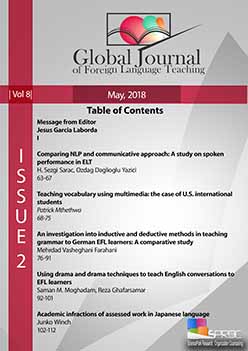Academic infractions of assessed work in Japanese langauge
Academic infractions of assessed work in Japanese langauge
Author(s): Junko WinchSubject(s): Language and Literature Studies, Education, Methodology and research technology, Translation Studies, ICT Information and Communications Technologies
Published by: Birlesik Dunya Yenilik Arastirma ve Yayincilik Merkezi
Keywords: Google Translate (GT); plagiarisms; higher education; Japanese langauge teaching;
Summary/Abstract: Google Translate (GT) is a free on-line translation tool and accessible to anyone including students who study languages.Before the advent of GT, dictionaries have been used by language learners, which have only receptive translation function.Unlike dictionaries, GT has two translation functions: receptive and productive. This productive function of GT has been increasingly creating problems in university language assessment and language teachers with students’ cheating, plagiarism or academic infractions. The purpose of this article is to find evidence that GT has a causal effect of students’ cheating,plagiarism or academic infractions. In addition, how coherence also seems to be associated with academic infraction is discussed before the methodology. The study investigated the formative Japanese coursework essay writings of three students who have studied Japanese for 1 year but with no basic understanding or knowledge of the Japanese language at a university of South of England. It is concluded that all the three students were suspected of committing plagiarism in spite of teacher’s warning of plagiarism. The implications of this study are directed at institutions, teachers and students. Institutions should review the information gap between the websites which are written for students and the university’s official published website statement on plagiarism. Institutions may also need to mention GT specifically in the plagiarism documentation. Institutions may also consider adopting an additional cover sheet system to use as students’ declaration of plagiarism. Language teacher should be familiar with the differences between plagiarism vs. cheatings, plagiarism vs.academic infractions/offences and the components of academic infractions of the university they work. Students shouldsubmit their own work, not using GT or copying and pasting translated sentences from websites.
Journal: Global Journal of Foreign Language Teaching
- Issue Year: 8/2018
- Issue No: 2
- Page Range: 102-112
- Page Count: 11
- Language: English

